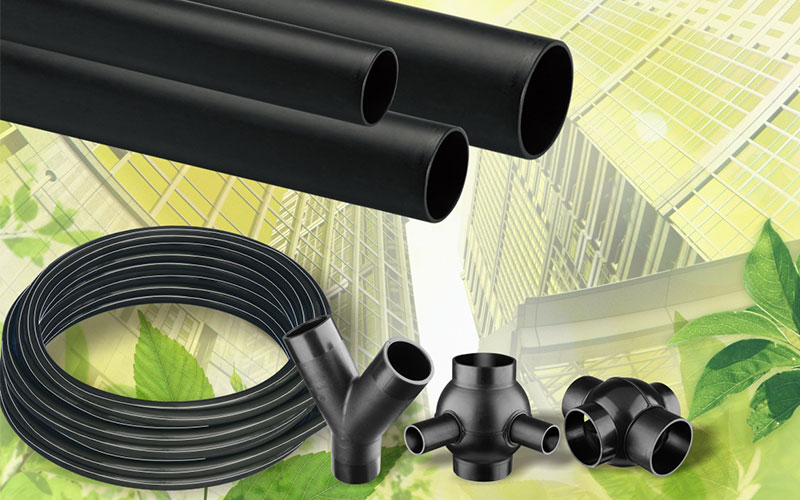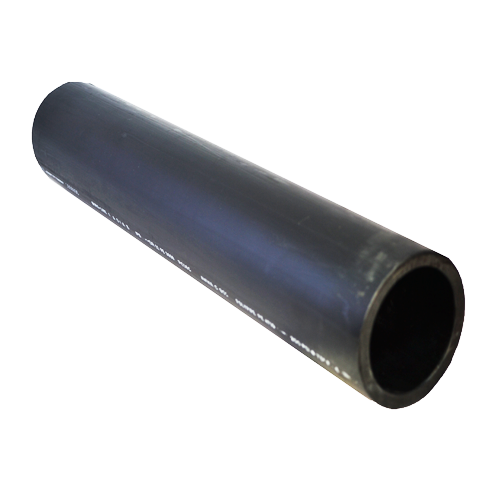American Plastics HDPE Pipe for Oilfield: Preferred in the Oilfield
Wiki Article
A Comprehensive Guide to the Different Usages of HDPE Pipe in Construction and Industry
HDPE pipes have actually arised as a crucial part in modern building and industrial applications. Their one-of-a-kind homes, such as resistance to corrosion and lightweight design, make them suitable for a variety of uses. From water supply systems to farming watering, HDPE pipelines offer services that boost effectiveness and sustainability. Comprehending their diverse applications is essential for experts looking to enhance facilities. What particular benefits do these pipes give each sector?Supply Of Water and Circulation Solutions
Supply of water and circulation systems are vital components of urban infrastructure, usually counting on high-density polyethylene (HDPE) pipelines for their longevity and effectiveness. These systems transport potable water from therapy centers to customers, guaranteeing availability and safety. HDPE pipelines are preferred for their resistance to deterioration, chemicals, and extreme temperatures, which improves their longevity and decreases maintenance costs. In addition, their lightweight nature allows for simpler installation and transportation, making them suitable for different urban and country applications.The flexibility of HDPE pipelines allows them to be set up in tight spaces and around obstacles, reducing the need for extensive excavation (Pipe Supplier American Plastics Midland). Additionally, their smooth indoor surface area minimizes rubbing losses, improving water flow rates. As cities proceed to expand, the demand for trusted water supply systems increases, placing HDPE pipes as a sustainable solution for modern infrastructure projects. Their tested performance history makes them a favored option among engineers and metropolitan coordinators alike
Wastewater Monitoring and Treatment
Effective wastewater monitoring and treatment are crucial for preserving public wellness and ecological high quality. HDPE pipes play a crucial duty in this procedure due to their longevity, resistance to rust, and ability to withstand rough chemicals. These pipes are typically used in different applications, consisting of sewer system, stormwater water drainage, and wastewater treatment centers. Their light-weight nature helps with easier installation and transportation, minimizing labor expenses and time.In enhancement, HDPE pipes have a smooth interior surface that reduces friction loss, advertising reliable circulation rates. They are likewise much less vulnerable to leakages and failings compared to conventional products, guaranteeing that pollutants are included successfully. Their flexibility enables for adaptability in various soil conditions, making them suitable for varied environmental settings. As industries progressively focus on sustainable techniques, the usage of HDPE pipes in wastewater administration systems straightens with goals for minimizing ecological effect and improving resource recuperation.
Agricultural Irrigation Solutions
In agricultural setups, efficient irrigation services are essential for optimizing crop returns and handling water sources. HDPE (High-Density Polyethylene) pipelines play an important function in modern watering systems due to their durability, flexibility, and resistance to corrosion. Their capability to endure high pressures makes them suitable for both surface area and subsurface watering applications, making certain uniform water distribution throughout areas.Farmers can use HDPE pipelines in drip irrigation systems, which provide water straight to plant origins, reducing wastefulness and advertising healthy growth. Additionally, these pipelines are lightweight and easy to install, reducing labor prices and installment time. Their lengthy lifespan and low maintenance requirements further boost their charm in agricultural methods.
HDPE pipes are ecologically friendly, as they can be recycled and do not seep hazardous chemicals right into the soil. This makes them a find more information lasting selection for farmers intending to adopt environmentally friendly agricultural approaches while taking full advantage of efficiency.
Industrial Applications and Procedures
Flexibility is a trademark of HDPE pipelines, making them vital in numerous commercial applications and processes. These pipes are extensively utilized in chemical processing industries as a result of their exceptional resistance to a vast array of destructive substances. HDPE's light-weight nature, integrated with high tensile stamina, enables easy setup and long-term efficiency sought after Visit Website environments.In the oil and gas field, HDPE pipelines play an important role in carrying hydrocarbons and gases, many thanks to their sturdiness and flexibility - Pipe Supplier American Plastics Midland. Furthermore, they are used in mining operations for the transport of slurry and various other products, where typical piping systems might fall short
In addition, HDPE pipes are significantly made use of in producing facilities for water supply lines and wastewater monitoring. Their ability to endure severe temperature levels and pressures makes them ideal for a selection of commercial procedures. Generally, HDPE pipelines add considerably to efficiency and security investigate this site throughout diverse industrial applications.
Stormwater Monitoring and Water Drainage Systems
Stormwater administration and drain systems are vital parts in metropolitan infrastructure, created to handle excess rainfall and decrease flooding dangers. High-density polyethylene (HDPE) pipes are significantly made use of in these systems as a result of their resilience, versatility, and resistance to corrosion. These pipelines efficiently move stormwater far from populated locations, minimizing surface area drainage and stopping waterlogging.HDPE's light-weight nature facilitates easier setup, reducing labor prices and building time. Furthermore, its resistance to chemicals and ecological stress factors warranties longevity and integrity in various environments. Along with traditional drainage applications, HDPE pipelines are likewise employed in cutting-edge remedies such as environment-friendly infrastructure, that includes rain gardens and absorptive sidewalks.

Regularly Asked Concerns
How Does HDPE Pipeline Contrast to PVC Pipeline in Cost?
As a whole, HDPE pipeline tends to be extra expensive than PVC pipe as a result of its boosted resilience and versatility. However, long-term expense considerations, such as upkeep and life-span, might favor HDPE in details applications.
What Is the Lifespan of HDPE Pipes Under Numerous Problems?
HDPE pipes typically have a life-span of 50 to 100 years, depending upon ecological conditions, installation practices, and usage. Factors such as temperature, dirt type, and direct exposure to chemicals can significantly influence their longevity.Can HDPE Piping Be Recycled After Usage?
Yes, HDPE pipelines can be reused after usage. The recycling process entails melting down the product, allowing it to be repurposed into brand-new items, therefore promoting sustainability and lowering environmental influence connected with plastic waste.Are There Any Type Of Specific Setup Challenges With HDPE Pipelines?
Installment obstacles with HDPE pipelines include correct jointing strategies, guaranteeing adequate trench problems, and taking care of thermal expansion. Furthermore, proficient labor is required to handle specific equipment, which can make complex the installment procedure in various settings.
What Certifications Should I Look for When Buying HDPE Pipings?
When acquiring HDPE pipes, one need to look for certifications such as ASTM, AASHTO, and ISO, which confirm high quality and compliance with industry requirements, guaranteeing resilience and efficiency in numerous applications. - American Plastics HDPE Pipe ManufacturingReport this wiki page